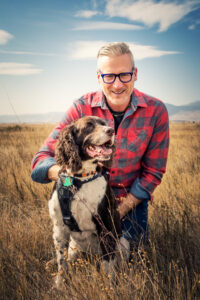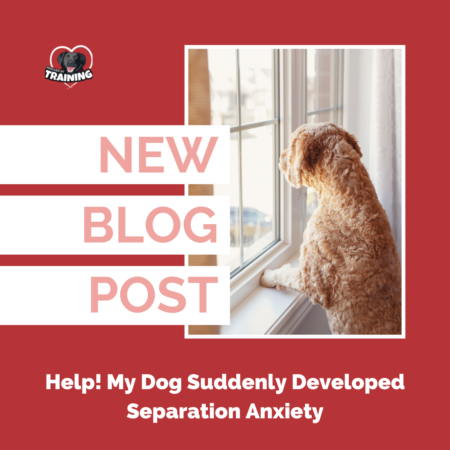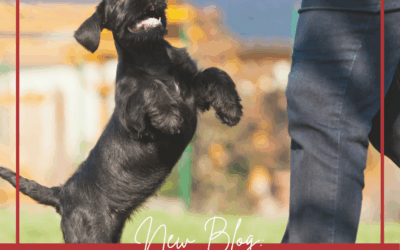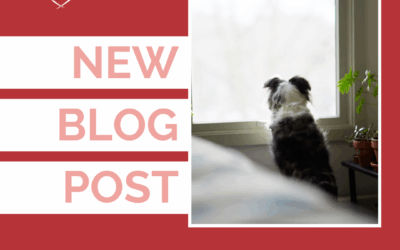Occasionally in my behavior practice, I get clients who come to me saying their dog “suddenly” developed separation anxiety. This is always somewhat of a red flag to me and requires some Sherlock Holmes level investigating and questioning. While the root cause of separation anxiety (or isolation distress) is not yet known, it’s not usually something that just randomly appears. Often owners will see signs of it when they bring a newly adopted dog or puppy home. But for dogs that have been in a stable home for a while, who have never showed symptoms of it and with no major life changes happening, it’s fairly uncommon, at least in my client base, for sep anx to just show up one day completely unexplained.
Now, that part – “completely unexplained” is what need to be explored. Separation anxiety can be triggered by major life changes – a move, death, marriage, new baby, change in schedules, construction, etc. But there is also evidence that shows separation anxiety and noise sensitivity are correlated as well as pain and noise sensitivity. The message here is that physical wellness is directly tied to behavioral health.
I’ve had many, many clients with separation anxiety and when they are not feeling well, whether from an upset tummy, anal glands that need to be expressed, allergies or pain, they do not do as well on their absences. And this is why during my initial intake assessment, while I’m not a vet, I do dig into some health history, because owners may not see the relevance to separation anxiety if a dog has GI or anal gland issues. Uncovering this information allows me to know if their vet needs to be looped in for successful training. I also dig into things like external noises like construction, traffic, neighbors – anything the dog might be hearing from inside the home, especially since we suspect that noise aversion/anxiety connection.
 When people contact me with the “Help! My Dog Suddenly Developed Separation Anxiety!” I find these dogs fit into the major life change category or are senior dogs and the issue isn’t really separation anxiety but may be pain or some other underlying medical issue. Last year I had one such call from a lovely owner saying his almost 13 year old dog “suddenly” developed alone time distress. After some digging into things, I strongly suspected some sort of pain, due to her age, recent hesitance to jump on furniture and a few other things he hadn’t pieced together. We decided to start a separation anxiety package in the interim, to help keep Sammy safe and not anxious, while he waited for an appointment with the vet. Sure enough the vet detected some likely joint pain from arthritis, started some pain meds and within 3 weeks, Sammy was back to comfortably lounging around during absences, just like she had for over a decade. A less qualified trainer may have gone down the rabbit hole of separation anxiety without a vet check and who knows how painful or anxious Sammy would be as a result.
When people contact me with the “Help! My Dog Suddenly Developed Separation Anxiety!” I find these dogs fit into the major life change category or are senior dogs and the issue isn’t really separation anxiety but may be pain or some other underlying medical issue. Last year I had one such call from a lovely owner saying his almost 13 year old dog “suddenly” developed alone time distress. After some digging into things, I strongly suspected some sort of pain, due to her age, recent hesitance to jump on furniture and a few other things he hadn’t pieced together. We decided to start a separation anxiety package in the interim, to help keep Sammy safe and not anxious, while he waited for an appointment with the vet. Sure enough the vet detected some likely joint pain from arthritis, started some pain meds and within 3 weeks, Sammy was back to comfortably lounging around during absences, just like she had for over a decade. A less qualified trainer may have gone down the rabbit hole of separation anxiety without a vet check and who knows how painful or anxious Sammy would be as a result.
My general rule of thumb when counseling clients is this:
Behavior isn’t random. It always happens for a reason. Any sudden behavior change always requires a vet check.
This applies not just to separation anxiety but things like potty training. If your perfectly housebroken dogs suddenly starts having accidents, that requires a vet check. But of course, if it’s a puppy and hasn’t been perfectly housebroken, it’s much more likely you just have an untrained dog.
I’m excited that there is new research from Dr. Daniel Mills that is looking into the root causes of separation anxiety that shows “The team, led by scientists from the University of Lincoln, UK, identified four main forms of distress for dogs when separated from their owners. These include a focus on getting away from something in the house, wanting to get to something outside, reacting to external noises or events, and a form of boredom.” I look forward to more research on this topic but until then, be sure you’re working with a qualified trainer who specializes in separation anxiety if you need help.
Don’t know where to start? Check out my Separation Anxiety Training Foundations (SATF) course, or if you want one on one training, contact me and schedule a session!
Happy training!
![]()




